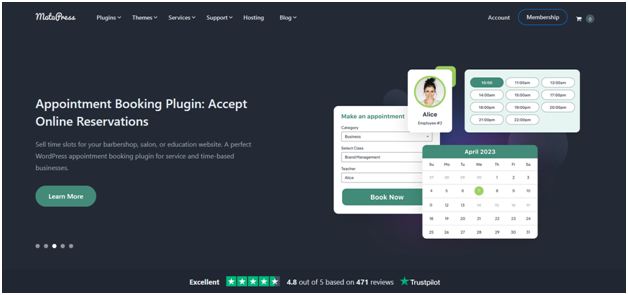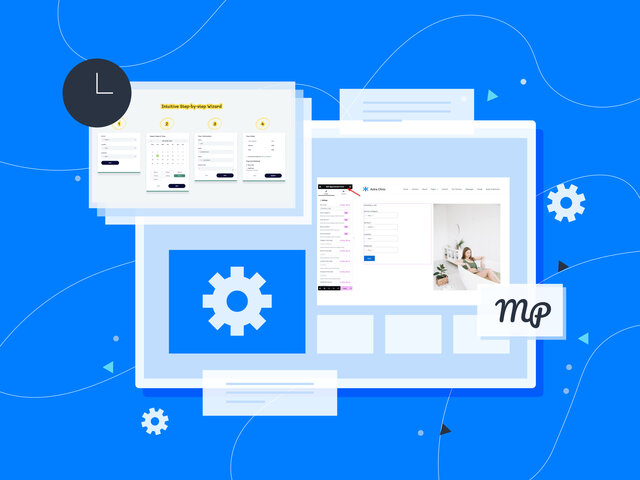With the global trend of moving all business operations to the Internet, particularly in areas of communication and customer attraction, enterprises across various niches increasingly rely on robust technical solutions that can manage these tasks. One example of such tools is online scheduling software, namely appointment booking plugins for WordPress.
As a leading Content Management System, WordPress has become the reliable platform for a multitude of companies creating tools to facilitate this need. For instance, one of these projects is MotoPress – a team of experienced professionals who primarily focus on creating themes and plugins for appointment scheduling businesses and property rental enterprises.
In the following sections, we delve into what WordPress appointment booking plugins are, their uses, advantages, disadvantages, and some concluding thoughts.
What is a WordPress Appointment Booking Plugin?

A scheduling tool of this type is a software add-on designed for WordPress websites that allow businesses to manage appointments and bookings online. These extensions enable website visitors to book appointments or services directly through the site, providing a user-friendly interface for both the customer and the business owner.
One of the best Elementor appointment booking plugins is the Appointment Booking extension from MotoPress. Compatible with the popular WYSIWYG page builder, it offers a multitude of useful features, such as a wizard-style reservation form, a convenient admin panel for the management of bookings, analytical tools, and more.
Uses of Appointment Booking Plugins
These tools are primarily used to simplify the scheduling process. They’re widely adopted across various sectors: healthcare clinics use them for organizing patient appointments, beauty and wellness centers for arranging sessions, and consulting firms for scheduling meetings. 0
Extensions of this type also play a significant role in event management, are popular in the fitness industry for class bookings, and are essential in restaurants for reserving tables. Essentially, they’re invaluable for any business where efficient appointment scheduling is a must.
Advantages of Appointment Booking Plugins
Now that we have uncovered what it is exactly and how it is used, it’s time to discuss the benefits this class of tools provides to business owners and customers:
- Increased Efficiency: Instead of manually managing appointments in Excel sheets or on paper, you can delegate this work to the appointment booking functionality. With a plugin facilitating this process, your customers can handle all bookings on their own. Automating the reservation process significantly reduces the workload on staff eliminating the need for manual scheduling;
- 24/7 Availability: With appointment reservation extensions, customers gain the flexibility to schedule appointments at any time of the day, according to their convenience. This functionality extends beyond standard business hours, allowing for bookings early in the morning, late at night, or even during weekends and holidays. This round-the-clock availability not only enhances the customer experience by offering greater freedom and accessibility but also ensures that your business can capture more opportunities for appointments, even when the office or store is closed;
- Reduced No-Shows: A significant advantage of many appointment booking tools is their capability to send automated reminders. This feature plays a crucial role in reducing the likelihood of missed appointments. By sending timely notifications via email or SMS, these plugins remind customers of their upcoming appointments, helping to keep their schedules on track. Additionally, some extensions offer the flexibility for customers to easily reschedule or cancel appointments, further reducing the instances of unattended appointments and enhancing overall customer satisfaction;
- Payment Integration: A key feature in many extensions of this type is the availability of payment processing. By facilitating secure and convenient payment options such as credit cards, PayPal, or other similar systems, these plugins streamline the entire transaction process. Such integration not only simplifies the administrative workload by automating the billing and payment collection but also enhances the customer experience by providing a seamless, one-stop solution for booking and payment.
Disadvantages of Appointment Booking Plugins
While the multiple advantages of this class of WordPress products significantly decrease the workload on your staff, increase revenue, and enhance customer satisfaction levels, some cons are worth knowing about:
- Dependence on Technology: Relying heavily on appointment plugins means that your business is somewhat at the mercy of technology. While these tools are incredibly efficient, they are not immune to technical issues or website downtime, which can disrupt the booking process. Such interruptions can arise from various sources, including server problems, software glitches, or routine maintenance. During these times, customers may be unable to make or modify bookings, potentially leading to frustration and missed opportunities for your business;
- Learning Curve: The adoption of any new technology often comes with a learning curve, and appointment scheduling software is no exception. Some of these extensions can be complex to set up, especially those with a wide array of features and customization options. This complexity means that business owners and staff members may need to invest time to understand and learn how to effectively use the system. The learning process can initially slow things down and might require additional resources in terms of time and training;
- Costs: One of the crucial considerations for any business, especially small ones, is the cost of implementing new tools. While the market offers a range of free appointment booking plugins, these often come with limited features. For more robust options that offer advanced functionalities like extensive customization, integrated payments, or enhanced analytics, there is usually a price tag attached. These costs can vary significantly, ranging from affordable monthly subscriptions to more substantial one-time or annual fees for premium versions;
- Overbooking Risks: Another potential downside to using automated appointment booking systems is the risk of overbooking. If the plugin is not properly configured or managed, there’s a possibility of double-booking or scheduling conflicts. This situation can arise from synchronization issues between the extension and other calendar systems being used, or from failing to update availability in real-time. Overbooking can lead to operational challenges, and customer dissatisfaction, and can harm the reputation of a business.
Final Words
You’ve been given an overview of WordPress appointment booking plugins, including how they’re used, their benefits, and their drawbacks. These tools are highly effective in boosting a business’s operational efficiency, providing both companies and their clients with convenience and flexibility.
The key approach to overcoming the potential challenges is to select an extension that aligns well with your business needs and invest time in setting it up correctly. In the long run, the benefits of streamlined scheduling and improved customer experience often outweigh the drawbacks, making these tools a worthy investment for businesses looking to modernize their appointment reservation processes.

